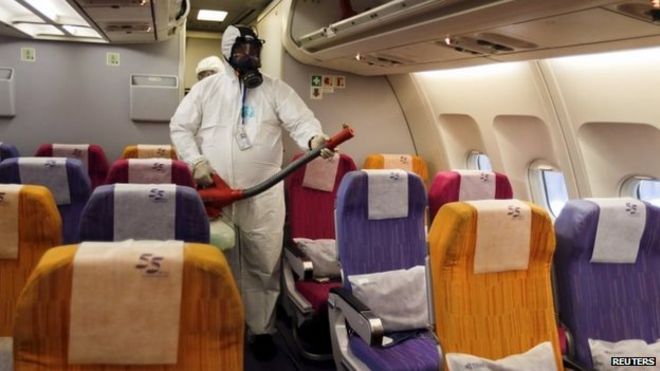The man - whose name has not been released - is now in quarantine at an infectious diseases facility outside the capital Bangkok.
Thai health officials said the 75-year-old from Oman was seeking treatment for a heart problem in Bangkok.
Nearly 60 people who came into contact with the patient have been identified.
That includes three relatives who travelled with him on the plane.
Thailand is a medical tourism hub, popular with patients from the Middle East.
"We advise the public not to panic because the patient and his family members were separated since the beginning," Thailand's Health Minister Rajata Rajatanavin said.
"Our system is ready and we are monitoring the cases closely."
South Korea on Friday reported the 24th death from Mers and said there were now 166 people infected. Thousands are still in quarantine.
The number of new cases in recent days has been low and World Health Organization (WHO) chief Margaret Chan expressed optimism over containing the outbreak being contained there.
South Korean health official Kwon Deok-cheol told reporters Mers had "levelled off" but added: "We need to watch further spread, further cases from so-called intensive control hospitals."
The outbreak in South Korea began in May with a 68-year-old South Korean man who had travelled to the Middle East - BBC
Middle East Respiratory Syndrome (Mers)
- Mers is caused by a coronavirus, a type of virus which includes the common cold and Sars (severe acute respiratory syndrome).
- First cases emerged in the Middle East in 2012, and the first death in Saudi Arabia in June that year.
- It is not known for certain how it is transmitted. It is possible the virus is spread in droplets when an infected person coughs or sneezes.
- Patients have a fever, cough and breathing difficulties, but Mers can also cause pneumonia and kidney failure.
- Approximately 36% of reported patients with Mers have died - there is no vaccine or specific treatment.
1,034 MERS cases worldwide, including 457 deaths
United Arab Emirates (UAE) officials have confirmed a new MERS-CoV case, the second in under a week, according to a World Health Organization (WHO) statement today.
The agency also provided new details on three cases in Saudi Arabia, whose health ministry also noted the death of a previously reported patient today.
The new MERS-CoV (Middle East respiratory syndrome coronavirus) case involves a 65-year-old male expatriate living in the UAE's Eastern region. He developed symptoms on May 31 and was hospitalized on Jun 6. He tested positive 2 days ago.
He has preexisting disease but no known exposure to other MERS patients or other risk factors. He is listed in critical condition in an intensive care unit (ICU). His contacts are being traced as part of routine public health investigations, the WHO said.
The illness raises the UAE's MERS count to 76 cases, 6 of which were reported this year, according to a list maintained by FluTrackers, an infectious disease message board.
The WHO said it has now been notified of 1,293 MERS-CoV infections worldwide, but FluTrackers' case list includes 1,340.
Some risk factors noted in Saudi cases
The Saudi MERS cases reported by the WHO today were confirmed from Jun 8 to 11.
They involve a 77-year-old man and 60-year-old woman in Hofuf and a 73-year-old man in Turubah.
The man in Hofuf developed symptoms on May 26 and was hospitalized the next day but was discharged May 31 without MERS-CoV testing. His symptoms reappeared on Jun 10, however, and he was hospitalized at a second hospital that day but died the next day. His exposure history is under investigation.
The 60-year-old woman in Hofuf developed symptoms Jun 2 but was not hospitalized until Jun 8. She had visited her daughter between May 26 and Jun 7 at a hospital that is experiencing an ongoing MERS-CoV outbreak. The daughter did not contract MERS. The 60-year-old is in stable condition.
The 73-year-old man in Turubah developed symptoms on May 23 and was admitted to a hospital in Jeddah on Jun 1. He has no history of contact with camels but has a history of frequent contact with sheep and of consuming raw sheep milk. He is in critical condition in an ICU. His case was first reported by Saudi Arabia's Ministry of Health (MOH) on Jun 10.
The man who died recently in Saudi Arabia was a 50-year-old national in Hofuf, the MOH said in its update today. The statement also noted that a 58-year-old foreigner in Riyadh has recovered from the disease. Neither is a health worker, and both had preexisting disease.
The country has confirmed 1,034 MERS-CoV cases since 2012, including 457 deaths. Six patients are still receiving care, and 1 is in home isolation, the MOH said.


No comments:
Post a Comment